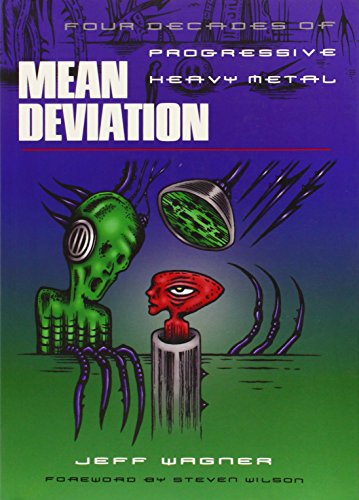Mean Deviation: Four Decades of Progressive Heavy Metal

So . . . who saw School of Rock? That 2004 movie with Jack Black? Anyone . . . anyone? Bueller? Well, there is a scene where substitute teacher Jack Black tries to explain rock and roll to his rock-band-forming kids, and he ends up drawing this hugely complex flow chart on the chart board, calling it the History of Rock. (Apparently this 30-second shot took the writers almost two weeks to finalize, so put that pause button to work and enjoy the scene.)
This book is just like that blackboard, only more detailed and with pictures.
Heavy metal and most of its subgenres (speed metal, prog metal, etc.) can sometimes seem like boy music. With names like Megadeath, Led Zeppelin, and Van Der Graaf Generator, the bands do not conjure images of flowers and unicorns. Well, maybe unicorns, but definitely not flowers. This is not Grandma’s music (unless Grandma is REALLY cool).
Starting with King Crimson, author Jeff Wagner creates his own blackboard-in-a-book of metal faves. Each chapter gets its own band—usually a big rock name like Iron Maiden, Norwegian band Enslaved, or Queensryche. As the reader learns how the band came to be and evolved, Wagner discusses other bands that influenced the featured band, as well as newer bands who were influenced by the main artist.
A former editor for Metal Maniacs magazine, Wagner is revered in certain circles for his astounding encyclopedic knowledge of metal. He can go toe to toe on the household names like Rush or Metallica, but also never fails to mention more obscure acts like Celtic Frost or Dream Theater.
Heavy metal gets a bad rap in the mainstream because it can sometime seem as if the band merely plugged in instruments and simply played three chords (not always together and not always well). As Wagner says “scream-therapy catharsis is a key element to many metal band’s sounds.” Even though there is more to the music than just a wall of sound, coming out of the mostly acoustic folk music of the 60s, metal can seem like a lot of noise to the uninitiated.
For those of us “egghead rockers” with even a modicum of knowledge about the genre, we know that there was more to prog rock/metal than just noise. Many of the songs are based on popular literature of the day, especially science fiction. For example, Rush’s “Anthem” was based on Ayn Rand’s book of the same title, and Led Zeppelin loved to quote Tolkien (make sure to catch Gollum’s cameo in “Ramble On”). With rhythmic shifts and asymmetrical time signatures, this music can get complicated—and Wagner works hard in his book to give the music the credit it is due.
If anyone is looking for a new metal bible, look no further. And rock on, my friend.
Rock on.